MAI-TAI
Development and characterization of novel de-icing systems with low power consumption, composed by polymeric paints additivated with active particles based on Joule effect or magnetic induction heating processes
Objectives

Development and characterization of novel de-icing systems with low power consumption composed by polymeric paints additivated with active particles AIMPLAS will be focused on the development of hateable coatings based on Joule effect, while AIN will develop systems based on magnetic induction effect.
One of the envisaged de-icing systems to be developed in this research project are coatings with heating processes based on Joule effect or magnetic induction by means of the deposition of polymeric coatings additivated with different electrically conductive or magnetic nanoparticles respectively. One remarkable advantage apart from their intrinsic heating features is the use of a common polymeric paint employed in aeronautics that complies with the different required standards. Additionally, the easy implementation of the coatings supposes a clear advantage with respect to other resistive systems currently employed.
- Milestones achieved -
Currently, the development of an active system based on a paint with carbonaceous and metallic fillers, heated by the Joule effect with an anti-icing activation time of 5 seconds in freezing cloud conditions, has been achieved.
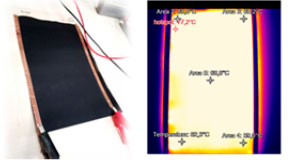
In the line of magnetic induction, the work based on nanocomposites with magnetic particles achieves temperature increases of 200ºC in 2 minutes.
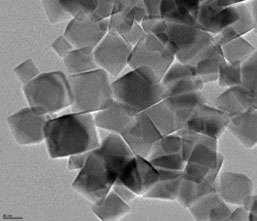
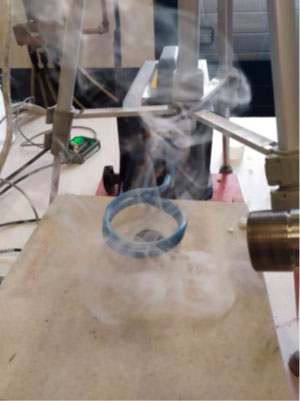
Development and characterization of durable and scalable anti-icing coatings based on different strategies. AIMPLAS will evaluate additivities on coatings for superhydrophobicity and their behaviour as anti-ice and study the synthesis of compounds that mimic the anti-freeze behaviour of some proteins found in nature. On the other side INTA and UPNA will focused on the development synergetic effect of organic-inorganic layers by sol-gel, and hard metallic-polymer compound materials, respectively.
The passive systems for anti-ice protection investigated in MAI-TAI are going to be based on a polymer matrix (polyurethane PU) and mostly on the combination of two concepts, concretely low-E polymers and nanoadditives with the aim to obtain superhydrophobicity together with a minimum sliding angle. These solutions combine the principal advantages of the two strategies and allows to modify chemically the polymeric matrix and at the same time to control the nano- and micro-rugosity of applied coating and hence to reduce contact angle, increase hydrophobicity and to provide ice-phobicity to the treated surface.
- Milestones achieved -
Regarding anti-icing coatings, among the results of the project is a coating generated by the electrospinning technique based on the Slippery Liquid Infused Porous Surface strategy, which reduces adherence to ice by up to 91% compared to aeronautical surfaces such as aluminum alloys and has a 1000 times higher corrosion resistance.
Comparing the coating with a material considered to have low adherence to ice, PTFE, the solution reached in MAI-TAI obtains 4 times better results.
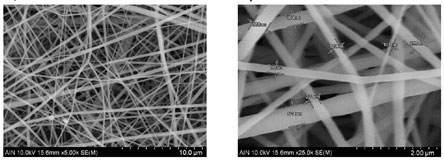
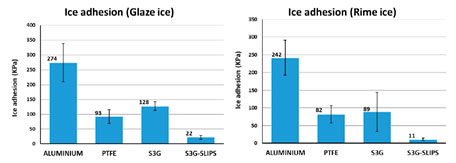
Superhydrophobic coatings have also been achieved by combining nanoparticles with low surface energy polymers that are easily applicable and compatible with the different surfaces used, as well as with the active solutions developed.
The superhydrophobic property is very useful for surfaces in combination with active systems and in areas not protected against ice where melted ice can reach in previous stages.
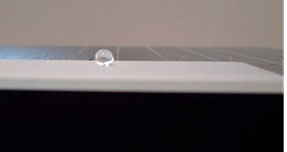


Development and characterization of synergy effect in hybrid Ice protection systems (IPS), by the combination of the most effective active and passive proposed previously by all partners.
As it was previously mentioned, one of the main objectives of the MAI-TAI project is the obtention of icephobic materials or coatings which main features should be energetic efficiency and higher durability with respect to the already implemented systems in aircrafts. For this purpose, a third general objective is proposed, focused on the merging or combination of these properties in a multilayered or hybrid system. The main goal of these novel coatings will be the reduction of the amount of power needed for the ice prevention and ice accumulation in comparison with the de-icing systems alone.
- Milestones achieved -
Combining the best active systems developed with passive solutions, it is possible to reduce the energy consumption of the former. The hybrid systems obtained to date have similar or even lower consumption than those currently in existence (20kW/m2).
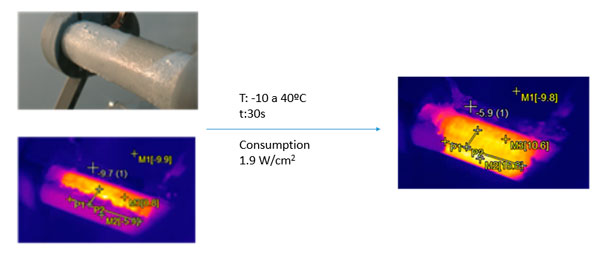
Development of a novel testing methodology completely based on icing metrics to be used as selection criteria defined by all partners, which allows to compare the efficiency of all the IPS typed: active, passive and hybrids, using common parameter. Finally, to evaluate the ice adhesion on dynamic conditions a new test will be develop by the joint work of INTA and AIMPLAS.
For the development of new technologies it is essential to know the characteristics of our system. Therefore, is essential to evaluate the ice protection systems by means of laboratory tests in similar conditions to the real ones that allow to demonstrate the mitigation of the formation of ice, the favoring of its detachment or the reduction of the necessary energy for these purposes. The greatest difficulty lies in generating supercooled water droplets with a MVD in the order of microns. In addition, the conditions of speed and LWC must also be reproduced.
- Milestones achieved -
Regarding the characterization of the proposed solutions, all decisions are being made based on tests carried out in an ice tunnel with conditions similar to those of icing in-cloud.
The characterization of materials in situations similar to the real one is essential, since the behavior and consumption are radically modified by the effect of variables such as the micrometric drop size, the impact speed of the drops on the surface or the influence of forced convection on the heating of materials.
The tests are monitored using different techniques that allow obtaining a lot of information on the behavior of the systems to be studied, such as images from different angles or thermographic characterization of the surfaces in vivo.
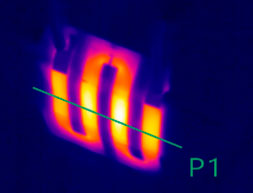
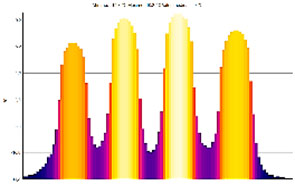
A methodology has been developed that allows evaluating passive systems in comparison with other passive ones, but also their effectiveness in combination with an active system, forming part of a hybrid. In this way, the development of the systems can be optimized separately and later combine the most effective ones.
Within the framework of the project, studies are also being carried out on the behavior of the materials in different areas of the aircraft affected by ice so that, knowing the problem and the conditions, it is possible to discern which solution is most suitable for each area, since there are no a universal solution that works well in all circumstances.
Thanks to the MAI-TAI project, two systems for evaluating the adhesion of ice by rotation are being launched in Spain, similar to the one existing at the Anti-Icing Materials International Laboratory: AMIL, a reference used by many research groups and manufacturers in the field of the icing. One of them is already available and working, generating results for the project and for clients who request it, and the other will be available shortly, being able to test adherence to active systems in this second one as well.


Consortium
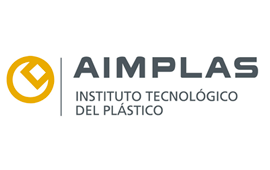
AIMPLAS
Paterna (Valencia)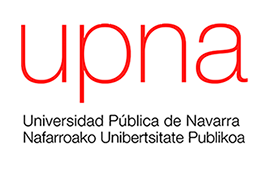
UPNA
Pamplona (Navarra)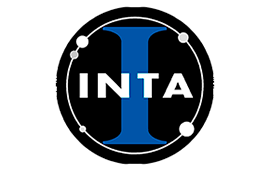
INTA
Torrejón (Madrid)
AIN
Cordovilla (Navarra)Stakeholders

AIRBUS Defence & Space
Getafe (Madrid)Results

-
A. De-ice heateable coatings
%
-
B. Anti-ice passive coatings
%
-
C. Hybrid systems
%
-
D. IPS Characterization and Ice adhesion evaluation
%
News / Events

Facing the Ice Issue: Science and Industry Advancing together

2nd GA Meeting – Pamplona
We continue with the execution of the MAI-TAI project, a project financed by the Ministry of Universities in the 2018 Research Challenges call. MAI TAI's objective is to develop new formulations for anti-ice coatings and new de-icing systems that allow avoiding and alleviating the formation of ice in parts of the aeronautical sector. On February 12 and 13, the meeting corresponding to month 6 of execution of the project was held at the facilities of the Navarra Industry Association, in which an informative seminar on the progress made was also held. have been seeing throughout the first annuity of the project. This conference is a perfect instrument to dynamically bring the results of the project closer to companies within the aeronautical sector, their main stakeholders.
Consortium members:
Universidad Pública de Navarra, Instituto Nacional de Técnica Aeroespacial, Asociación de la Industria Navarra, AIMPLAS · Instituto Tecnológico del Plástico.
Other entities attending the event: AIRBUS SPACE AND DEFENCE, SOGECLAIR aerospace, Aernnova Aerospace, Siemens Gamesa, Doppelmayr Cable Car.
#TE&M,
#MaterialesAvanzadosAIN
Publications in Scientific Journals
| Inside the project |
|---|
|
Icephobic and Anticorrosion Coatings Deposited by Electrospinning on Aluminum Alloys for Aerospace Applications
Vicente, A., Rivero, P. J., García, P., Mora, J., Carreño, F., Palacio, J. F., & Rodríguez, R. I. (2021). Polymers 2021, 13, 4164. DOI: 10.3390/polym13234164 |
|
Evaluation of Functionalized Coatings for the Prevention of Ice Accretion by Using Icing Wind Tunnel Tests
Rivero, Pedro J., Rodríguez, Rafael J., Larumbe, Silvia, Monteserin, Maria, Martin, Francisco, Garcia, Amador, Acosta, Carolina, Clemente, María José, Garcia, Paloma, Mora, Julio, Agüero, Alina.. Coatings (2020), 12 (7), 636 DOI: 10.3390/coatings10070636 |
|
Recent Advances in the development of magnetic nanoparticles for biomedical applications
Monteserín María, Larumbe Silvia, Martínez V. Alejandro, Burgui Saioa, Martín L. Francisco Journal of Nanoscience and Nanotechnology 21 (5) 2021 pp 2705-2741 https://doi.org/10.1166/jnn.2021.19062 |
Related |
|
Quasicrystalline Coatings Exhibit Durable Low Interfacial Toughness with Ice
Majid Mohseni, Letícia Recla, Julio Mora, Paloma García Gallego, Alina Agüero, and Kevin Golovin ACS Applied Materials & Interfaces 2021 13 (30), 36517-36526 DOI: 10.1021/acsami.1c08740 |
|
Hard quasicrystalline coatings deposited by HVOF thermal spray to reduce ice accretion in aero-structures components.
Mora, J., García, P., Muelas, R., & Agüero, A. (2020). Coatings, 10(3), 290. DOI: 10.3390/coatings10030290 |
Presentations / Congresses
|
Next presentation in International Conference on Metallurgical Coatings and Thin Films (ICMCTF), San Diego, California, USA, May 22-27 2022.
|
|
Surfaces, Interfaces and Coatings Technologies International Conference Barcelona, Spain April 27-29 2022
|














